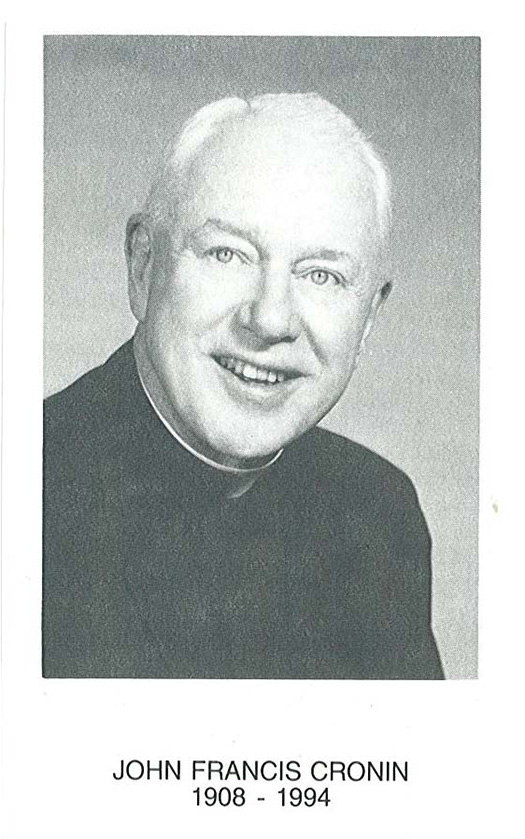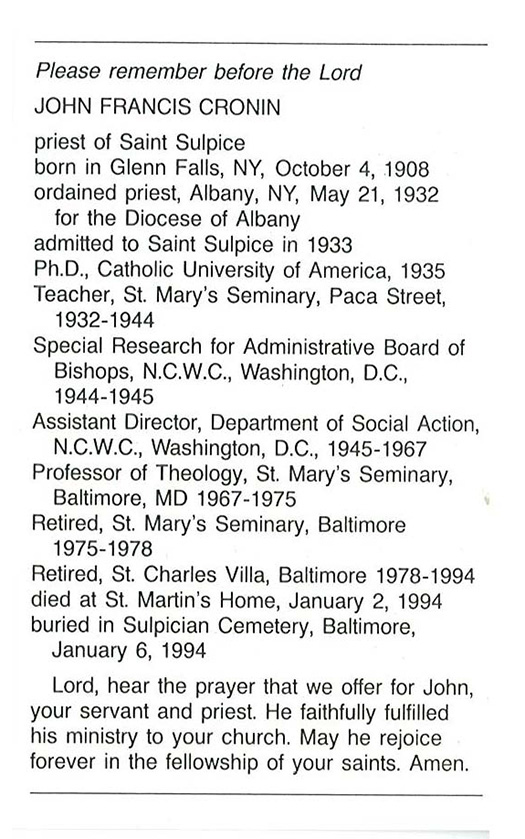1994, January 2
Date of Birth: 1908, October 4
March 1, 1994
At the age of fourteen, John Francis Cronin entered Holy Cross College in Worcester, Massachusetts. He had finished his grade and high school years between 1913 and 1923. Remarkably gifted intellectually, he was nonetheless a person remarkably humble, a trait he carried all through his life. After two years he applied for and was granted a scholarship to the Basselin College of the Catholic University of America in Washington, D.C.; the College was (and is) a three-year institution for priesthood candidates and specializes in Philosophy and Public Speaking. John Cronin, at the age of twenty, graduated in 1928, as valedictorian with an M.A. degree in Philosophy.
John Cronin continued his seminary education at Catholic University in the Sulpician Seminary (now Theological College). From the Sulpician Seminary he was ordained to the priesthood for the Diocese of Albany in 1932, having achieved his S.T.B. degree. Before that, however, he had applied in 1929 for admission to the Society of St. Sulpice and had been admitted as a candidate. After his priesthood ordination, he made his novitiate in the Solitude on the grounds of St. Charles College in Catonsville, Maryland. He was admitted to the Society in 1933. That admission brought him to the verge to his abundantly fertile years of teaching, lecturing, authorship, and religious, political and social leadership for the Catholic Church in the United States.
Father Cronin’s qualities of leadership and humility were rooted in a pious Catholic family of Glens Falls, New York, the parents of which were blessed with nine children of whom John was the eldest. Besides John, two became priests (one, Paul, a Sulpician); one a nun; and another who became mayor of Glens Falls. They were an exceptionally close-knit family. All had, besides organizational and social talents, high intellectual qualities — but none so high as John’s.
Father Cronin’s intellectual gifts were first put to use for St. Sulpice in 1933 in St. Mary’s Seminary’s Department of Philosophy on Paca Street. There he taught Philosophy and Economics, but his influence was not confined to the classroom. He was popular and was, albeit respectfully, regarded by the students in their sports as a contemporary. He was especially active as a handball player in the vast, wooden, airplane-hangar-like sheds on the seminary grounds. But most importantly, he was a much sought-after spiritual director. His masses and meditations were edifying and did much towards contributing to the respect he had from the seminarians. It was for them that he wrote his first textbook, Economics and Society, in his early years of priesthood. That textbook, a new approach in its field — Catholic social philosophy — attracted the attention of the American Church’s leading sociologists. Under not unwelcome pressure from them, Father Cronin became actively involved in social action; he was soon in demand as a pamphleteer, lecturer, and conference participant. In all this, he was under the expert guidance of his Provincial Superior, Father John F. Fenlon, accepting some offers, declining others. His prominence in the field of social thought and action soon brought him to a behind-the-scenes involvement in local social and economic issues. The nation was still in the Great Depression and was on the brink of war. Unemployment was widespread and subversive forces were at work. It was inevitable that Father Cronin would be called on to become active in the local community. His efforts in thwarting Communism were prodigious; they continued even after he took up residence in Washington, D.C., in 1945. He was persuasive in influencing labor leaders to rid their unions of Communist infiltrators. In the same timeframe he developed close ties with agents of the Federal Bureau of Investigation, agents who supplied him with ammunition in his leadership of local anti-Communist forces. His most significant activity in this regard was perhaps his involvement in the case of Alger Hiss. This resulted in his contact with then Congressman Richard Nixon. Nixon’s regard for Father Cronin lasted to the end of Father Cronin’s life. Years after the Hiss affair, Father Cronin became a speechwriter for Nixon, during Nixon’s years as vice president.
Back briefly to the early years. Father Cronin was meanwhile teaching class, authoring economic textbooks, writing pamphlets, and lecturing. His reputation had become country-wide; his enormous energy and its positive results very probably were the reason that the bishops of the United States commandeered his services. They called him to Washington where, for more than twenty years, he acted as Assistant Social Action Director of the National Catholic Welfare Conference while continuing his labors in the promotion of Catholic social action.
But in spite of his high place in the Catholic Church, he remained a simple Sulpician. He carried on extensive correspondence with his superiors in St. Sulpice. He never published a line or accepted a speaking engagement without their permission. He was faithful in attending Sulpician retreats, anxious to be with his confreres.
He donated generously to the fund for the education of candidates to St. Sulpice, and to the American Sulpician missionary endeavor. His letters asking prayers for the needs of those in his employ were frequent. He may have been in a high executive position, but he never lost a pastoral attitude in regard to those under him. All his life and work exhibit an unconscious, unpretentious, but genuine, humility.
When in 1967 his Provincial Superior, now Father Paul Purta, asked him to resign his office at the National Conference of Catholic Bishops, he promptly, in humble obedience, consented. It was now the post-Vatican II era with its revolutionary effect on the Church and on seminaries. Father Cronin was needed to supplement a teaching corps a bit attenuated by the winds of change. In his seminary days he had written to Father Fenlon about his interest in Moral Theology. That interest was now re-awakened as he settled in at St. Mary’s Seminary School of Theology at Roland Park. He immediately applied himself as vigorously to seminary work as he had to pastoral work on the national level. Father Cronin was soon making contributions to the field of Moral Theology, having adapted himself to a milieu created by new outlooks in the Church. It was not long before he was publishing theological views as innovative as his sociological views once were.
Age, however, was beginning to collect its tolls. Father Cronin was beginning to have eye troubles and other health problems. Nearly blind, cataract surgery restored health to those corridors to his mind — eyes that had made possible his labors over the decades. To the last days of his life Father Cronin’s eyes served as the medium through which his mind functioned. Though his mind kept its vigor to almost his final days, his body was beginning to react to the ravages of time and the waning of physical power. Even so, the Apostolic Delegation called upon him to render an important service to the Church. He and fellow-Sulpician, Father John Canfield, were asked to supply information about press reports on matters pertinent to the Church’s mission in the United States.
In 1978 Father Cronin, in increasingly failing health, moved to St. Charles Villa, the Sulpician retirement home in Catonsville, Maryland. It was not long before Father Cronin’s physical infirmities occasioned for him a move to the infirmary of St. Martin’s Home. The move was made with his customary humility and obedience. Father Cronin was becoming (and finally became) totally deaf. His ability to move about declined to the point where he could no longer walk, forcing him to use foot-power to take him, now wheelchair bound, to the chapel of St. Martin’s to concelebrate there the daily community Mass, to St. Charles Villa occasionally, and to community affairs (e.g., St. Patrick’s Day parties) in the Home. Father Cronin never lost his cheerful disposition nor his avid interest in the world around him. He was a subscriber to The New York Times, The Washington Post and The Christian Science Monitor. On Sundays, Father Raymond Hesler, his fellow-Sulpician and fellow-diocesan, devotedly went to purchase for him the Times and the Post.
In his last days the Lord whom he had served so long and so fruitfully called upon Father Cronin for even deeper sacrifice. His legs, “useless” for so many months, because of gangrene were causing him excruciating pain. Threatened with amputation, he was called to eternal life before suffering that final humiliation. He died on January 2, 1994.
Father Cronin’s burial Mass was celebrated on January 6th at St. Isaac Jogues Church where his brother, Monsignor James Cronin, was pastor. The principal celebrant of the Mass was Auxiliary Bishop Francis Murphy of Baltimore; the homily was delivered by his dear friend and associate at the National Catholic Welfare Conference, Monsignor George Higgins. Monsignor Higgins beautifully illustrated that Father Cronin’s work continues to contribute to and enhance the life of the Church in the United States in the ‘90s and will do so into the foreseeable future.
Kipling once wrote something like this: “He walked with kings but never lost the common touch.” That line is an apt summing up of John Cronin. He dealt with cardinals, bishops, other influential Churchmen. He dealt with important men in every branch of government: with career diplomats, bureaucrats, congressmen, senators, and even a president. Someone else might have become puffed up, impressed by and conscious of his own importance, ready to impress others with his own high status. But not John Francis Cronin. He died as he had lived: with a merry heart and a modest demeanor, and a humble acceptance of God’s will.
Vincent M. Eaton, S.S.
St. Charles Villa


